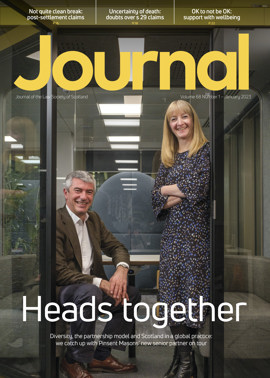Book reviews: January 2023
Scots Criminal Law
5th edition
Cubie, Cottam and McIntyre
PUBLISHER: BLOOMSBURY PROFESSIONAL
ISBN: 978-1526523327
PRICE: £48 (E-BOOK £38.88)
Six years have passed since the last edition of this invaluable book hit the bookshelves.
The book addresses the general principles and thereafter the main common law and statutory offences, covered under four heads: offences against the person, including homicide and sexual offences; social protection offences, including the Misuse of Drugs Act 1971 and road traffic offences; property offences, including theft, robbery, embezzlement and malicious mischief; and offences against the state and administration of justice, including contempt of court and interfering with the course of justice.
The crimes are thoroughly described, with an abundance of case law together with helpful discussion. This is not a book which simply states the law; rather it encourages thought about how the crime is constituted and proved, and also, particularly with references to the Scottish Law Commission report, why sexual offences were created under statute.
In the period since the last edition, the law of evidence has been developed and interpreted at pace. The substantive criminal law has developed at a slower pace, although, as the authors demonstrate, with no less importance.
Sexual offending accounts for around 70% of the caseload before the High Court of Justiciary. In an ingenious marketing step, the chapter on sexual offences is available to download for free from the publisher’s website. In that chapter the authors deftly consider the offences created by the Sexual Offences (Scotland) Act 2009, as well as the common law offences which are still invoked in historical sexual offending indictments. In considering the question of consent and free agreement, the authors point to the decision in HM Advocate v SM 2019 SCCR 255 to demonstrate that “free agreement did not mark a departure from what was understood to be meant by consent under the pre-existing common law”.
The authors consider likewise the question of “What is a sexual act?”. With reference to s 60 of the Act and the recent case of Ferguson v HM Advocate 2022 SCCR 26, they answer that straightforwardly as: “It is an objective test. The reasonable person will know it when they see it.” The question was recently considered in PF Edinburgh v Aziz [2022] HCJAC 46, where at para 24, in considering whether an oral communication between a taxi driver and two young women that they offer him sex in place of the fare was an offence under s 7 of the 2009 Act and finding that the communication breached s 7, it held that “the relevant purpose is established (i.e. held proved) if it can reasonably be inferred that the accused was ‘doing the thing’ (acting?) for that purpose. That is an objective test. The court is not directed towards determining what the accused’s subjective purpose (intention) actually was, since that purpose is proved if an inference of one of the stated purposes is capable of being drawn from the accused’s actings”.
Another area where the book is particularly strong is the consideration of the question of the proof of wicked recklessness within the context of intention in murder and culpable homicide. The authors pose the question whether it is subjective or objective. Following an insightful discussion of the relevant case law including Petto v HM Advocate 2012 JC 105 and 2008 JC 131, the authors refer to Scott v HM Advocate 2012 SCCR 45 in that what is required to be established is either intention to kill or “such a degree of wicked recklessness as to amount to reckless indifference to the consequences”.
The authors give the impression they were under some time constraint. This is evident in some of the footnotes. For example, the citation for Scott (above) is incomplete in para 10.10, and the case does not appear in the list of cases.
However this is an outstanding, easily accessible and digestible text that every criminal practitioner ought to have readily to hand.
David J Dickson, solicitor advocate
Regulars
Perspectives
Features
Briefings
- Civil court: Costs – the tail that wags the dog
- Licensing: Keeping alcohol out of sight
- Planning: A framework for sustainability?
- Insolvency: When is a creditor not a creditor?
- Tax: A new, improved autumn statement?
- Immigration: First stop Rwanda?
- Scottish Solicitors' Discipline Tribunal: January 2023
- Civil court: Expenses – barred by delay?
- Property: Transparency, human rights and the registers






